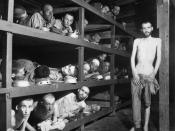An Analysis of Social Protest Writing in the Literature of Mann, Wiesel and Grass
Imagine sitting in a cold, crowded room with no clothes on. Think of what it would be like to be referred to as "87." This is what it was like for many people who lived through the horrors of the Holocaust and many other events caused by the Nazi regime. However, not all of them lived to tell their story. The writing of Günter Grass, Thomas Mann, and Eliezer Wiesel displayed social protest towards the Nazi regime in Germany through their literature. To prove this point, it is necessary to examine the underlying factors of World War II, the climax of the Nazi regime. It is also helpful to refer to analysis of the works by each of these authors to help determine how they affected society and how they changed it. Through analysis of several works, elements such as characterization, plot, setting, theme and structure will be studied.
The Holocaust coincides with World War II, and was started with Hitler's invasion of Poland on September 1, 1939 (Saldinger, 6). The original problem, though, began several years earlier. In January of 1933, Hitler was appointed Chancellor of Germany, which had a Jewish population of 566,000. Soon after, in March, Hitler was given dictatorial powers. Concentration camps were slowly evolving from the ghettos which they once were, and Jews were gradually being prohibited from a variety of things, including owning land and being newspaper editors. Hitler continued to make alliances with other nations, which eventually helped him to be able to persecute many other people besides those in the lands he ruled (Holocaust Timeline).
Several days after the Nazis invade Poland, England and France declare war on Germany, as they wisely chose not to ally with Hitler.


